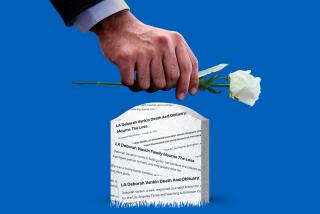Be Wary of Scam Artists After a Disaster Strikes
- Share via
As Americans mobilize to send food, clothing and cash to the victims of Hurricane Katrina, charity experts, regulatory authorities and members of Congress are issuing warnings about bogus philanthropies and fake business opportunities.
“There are a lot of bad people willing to prey on people with good intentions,” said Trent Stamp, executive director of Charity Navigator, a New Jersey-based watchdog group.
Con artists have emerged within days of every major disaster, going back well before the tsunami in southern Asia in December and the 9/11 terrorist attacks.
Armed with emotional appeals to donate to relief efforts or invest in humanitarian technology -- and often mimicking the names of legitimate organizations -- these crooks siphon millions that could be used to aid disaster victims, experts said.
“Bottom-feeding con artists always try to find ways to exploit tragic headlines to cash in on unsuspecting investors,” said Franklin L. Widmann, chief of the New Jersey Bureau of Securities and president of the North American Securities Administrators Assn. In the aftermath of Katrina, he said, “investors should be patient and cautious.”
The warning sign of a dubious charity or investment is the pitchman’s sense of urgency, Stamp said.
Bogus charities commonly urge donors to give immediately, often offering to “send a runner” to the donor’s door to pick up a check or money order. Con artists who contact donors by phone or e-mail may ask for immediate donations by credit card.
Legitimate charities never send runners to your door, Stamp said. They also generally don’t phone -- particularly not after a disaster. Although many charities accept donations by credit card, they take “no” for an answer and don’t balk when donors say they need more time to consider a request.
Prospective donors to hurricane relief should choose the organization and initiate the contact, Stamp said. Those tempted to give to a group calling on the phone should ask for a charity information card, which provides details about the fundraising appeal and its costs. If the caller refuses, hang up.
Those who want to help but can’t afford to give cash can offer time, Stamp said. It may not be glamorous, but some groups may need help simply answering their phones and opening mail at a time when their full-time staff is likely to be swamped with aid requests, he said.
Be sure to investigate any organization thoroughly before donating, he added. That can be as simple as going to a website such as Charity Navigator (www.charitynavigator.org) or the Better Business Bureau’s Wise Giving Alliance (www.give.org), both of which provide information about charities’ fundraising, programs and expenses.
The needs of hurricane victims will not evaporate overnight. But donations given to con artists will.
“A little research can go a long way to stopping the con artists who try to turn this tragedy into a profit-making venture,” said Sen. Charles E. Grassley (R-Iowa) in a written warning Thursday. “By making sure a charity checks out, those who are giving can make sure their valuable contributions reach the countless victims of this devastating natural disaster.”
Detecting opportunistic investment scams can be trickier, said Bob Webster, a spokesman for the North American Securities Administrators Assn. After 9/11, he said, a raft of “security” companies started pitching stock, claiming that they were going to make money by doing good -- creating biohazard detectors, among other things.
Although legitimate security firms have thrived in the last several years, the bogus firms are long gone -- often with millions of investors’ dollars.
Recently, officials at the securities group were hearing that rising oil prices had boosted the incidence of energy scams. In these, investors are urged to buy into oil wells or energy-producing partnerships, but when they investigate further, they find that there are no wells, no oil leases -- no prospect for anything except losing their money.
Webster expects these phantom investments to proliferate with Gulf Coast oil production in turmoil. Other opportunistic investment scams may concern water-purification technology or investment pools aimed at helping hurricane victims relaunch lost businesses, he said.
As with charity scams, the first sign of trouble is aggressive sales techniques -- cold callers insisting that “this is a one-time opportunity.”
Legitimate investments come with paperwork, Webster said. Request written information that fully explains the investment -- this is generally called a prospectus or offering circular. And check with your state securities regulator to make sure that both the salesperson and the security are licensed, he said.
“One phone call can save a lot of money,” Webster noted.
His group posts contact information for all state securities regulators, as well as regulators in Canada and Mexico, on its website, www.nasaa.org.
*
Kathy M. Kristof, author of “Investing 101” and “Taming the Tuition Tiger,” welcomes your comments and suggestions but regrets that she cannot respond individually to letters or phone calls. Write to Personal Finance, Business Section, Los Angeles Times, 202 W. 1st St., Los Angeles, CA 90012, or e-mail kathy.kristof@latimes.com. For previous columns, visit latimes.com/kristof.
More to Read
Sign up for Essential California
The most important California stories and recommendations in your inbox every morning.
You may occasionally receive promotional content from the Los Angeles Times.












